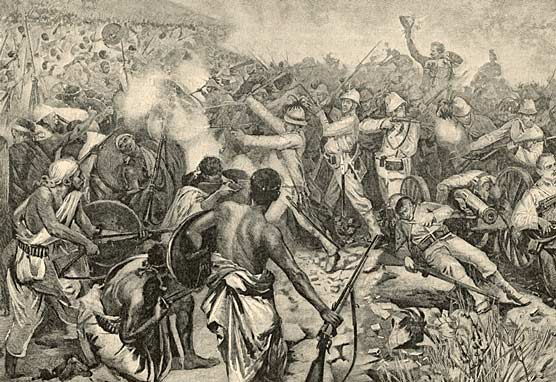
all wargames figures by strategia e tattica.check them out.

The Italians suffered about 7,000 killed and 1,500 wounded in the battle and subsequent retreat back into Eritrea, with 3,000 taken prisoner; Ethiopian losses have been estimated around 4,000–5,000, but with 8,000 wounded.
 carabinieri
carabinieriIn their flight to Eritrea, the Italians left behind all of their artillery and 11,000 rifles, as well as most of their transport.
As Paul B. Henze notes, "Baratieri's army had been completely annihilated while Menelik's was intact as a fighting force and gained thousands of rifles and a great deal of equipment from the fleeing Italians."

The 3,000 Italian prisoners, who included General Albertone, appear to have been treated as well as could be expected under difficult circumstances, though about 200 died of their wounds in captivity.

However, 800 captured askaris, regarded as traitors by the Ethiopians, had their right hands and left feet amputated.
 Augustus Wylde records when he visited the battlefield months after the battle, the pile of severed hands and feet was still visible, "a rotting heap of ghastly remnants.
Augustus Wylde records when he visited the battlefield months after the battle, the pile of severed hands and feet was still visible, "a rotting heap of ghastly remnants.
Further, many had not survived their punishment, Wylde writing how the neighborhood of Adwa "was full of their freshly dead bodies; they had generally crawled to the banks of the streams to quench their thirst, where many of them lingered unattended and exposed to the elements until death put an end to their sufferings."There does not appear to be any foundation for reports that some Italians were castrated and these may reflect confusion with the atrocious treatment of the askari prisoners.

Baratieri was relieved of his command and later charged with preparing an "inexcusable" plan of attack and for abandoning his troops in the field. He was acquitted on these charges but was described by the court martial judges as being "entirely unfitted" for his command. Chris Prouty offers a panoramic overview of the response in Italy to the news:


Crispi resigned on 9 March. Troops were called out to quell demonstrations in Naples. In Pavia, crowds built barricades on the railroad tracks to prevent a troop train from leaving the station.Below is important new book on Napoleon the thirds role in Italy up till this time overlooked by many

The Association of Women of Rome, Turin, Milan and Pavia called for the return of all military forces in Africa. Funeral masses were intoned for the known and unknown dead. Families began sending to the newspapers letters they had received before

Adwa in which their menfolk described their poor living conditions and their fears at the size of the army they were going to face.

King Umberto declared his birthday (14 March) a day of mourning. Italian communities in St. Petersburg, London, New York, Chicago, Buenos Aires and Jerusalem collected money for the families of the dead and for the Italian Red Cross.

One question much asked – both then and long afterward – is why did Emperor Menelik fail to follow up his victory and drive the routed Italians out of their colony?
 mma miniatures 54mm
mma miniatures 54mmThe victorious Emperor limited his demands to little more than the abrogation of the deceptive Treaty of Wuchale. In the context of the prevailing balance of power, the emperor's crucial goal was to preserve Ethiopian independence. In addition, Ethiopia had just begun to emerge from a long and brutal famine; Harold Marcus reminds us that the army was restive over its long service in the field, short of rations, and the short rains which would bring all travel to a crawl would soon start to fall.

At the time, Menelik claimed a shortage of cavalry horses with which to harry the fleeing soldiers. Chris Prouty observes that "a failure of nerve on the part of Menelik has been alleged by both Italian and Ethiopian sources." Lewis believes that it "was his farsighted certainty that total annihilation of Baratieri and a sweep into Eritrea would force the Italian people to turn a bungled colonial war into a national crusade" that stayed his hand.

As a direct result of the battle, Italy signed the Treaty of Addis Ababa, recognizing Ethiopia as an independent state. Almost forty years later, on 3 October 1935, after the League of Nations's weak response to the Abyssinia Crisis, the Italians launched a new military campaign endorsed by Benito Mussolini, the Second Italo-Abyssinian War.
This time the Italians employed vastly superior military technology such as tanks and aircraft, as well as Chemical warfare, the Ethiopian forces were soundly defeated by May 1936.

Following the war, Italy occupied Ethiopia for five years (1936–41), before eventually being driven out during World War II by British Empire and Ethiopian patriot forces.

The Russian state, as a sincere ally, enthusiastically paid victory compliments to the Ethiopian army.
SOLDIERS ALWAYS ON SALE .45,000TH SOLDIER SOLD TODAY

No comments:
Post a Comment